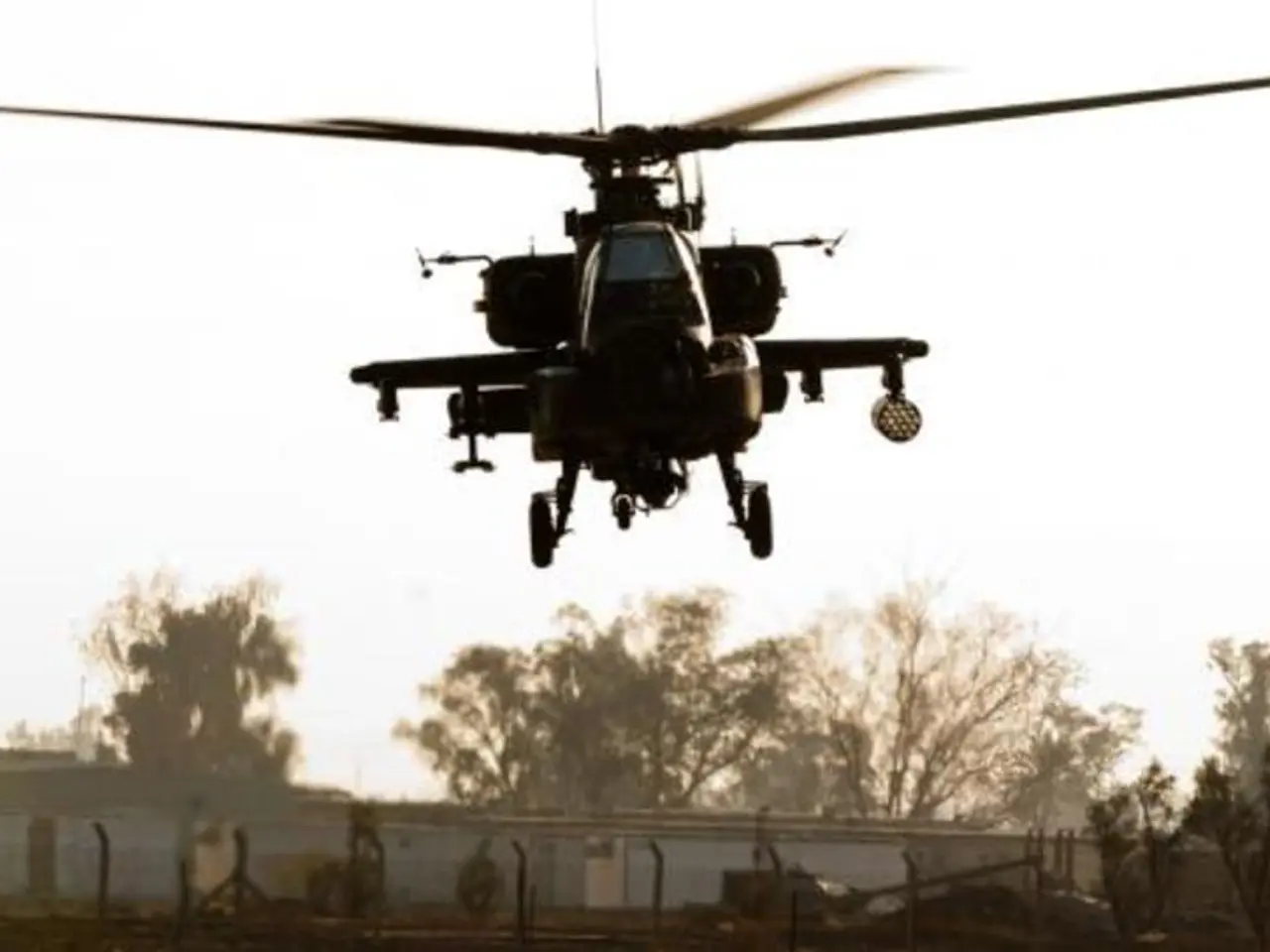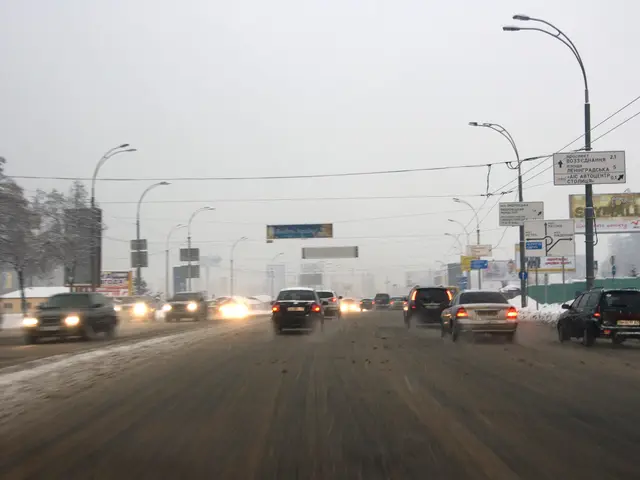Helicopter accident in Ghana claims lives of defense and environment ministers
In a shocking turn of events, Ghana's Defense Minister, Edward Omane Boamah, along with three crew members, five passengers, and fellow Environment Minister Ibrahim Murtala Muhammed, lost their lives in a helicopter crash on Wednesday. The helicopter, en route to an event focused on combating illegal mining, dropped off radar hours before the crash was reported.
The tragic accident occurred in a heavily forested area, northwest of the capital, bound for Obuagadougou, Burkina Faso. The helicopter's passengers included Samuel Sarpong, vice chairman of President John Mahama's National Democratic Congress party.
The news of the crash has sent shockwaves across Ghana, with President Mahama cancelling his official activities for the day and flags being flown at half-mast. His chief of staff, Julius Debrah, extended condolences and sympathies to the families of the deceased.
The Defense Minister, Edward Omane Boamah, had become President Mahama's Defense Minister earlier this year. He was also set to release a book titled "A Peaceful Man in an African Democracy," about former president John Atta Mills, who died in 2012.
The Environment Minister, Ibrahim Murtala Muhammed, was leading efforts to combat illegal, informal gold mining in Ghana, known locally as "Galamsey." The establishment of the Ghana Gold Board and the ban on foreigners from the local gold trade were seen as the first concrete signs of a crackdown on the practice by the new administration.
Illegal mining, a significant and ongoing problem in Ghana, remains a grave environmental and economic threat. The government has intensified efforts against it, arresting at least 1,345 illegal miners and seizing over 400 excavators and machinery commonly used in these operations. To regulate and prevent the influx of heavy mining equipment, over 1,200 excavators are being held at port pending validation, aiming to cut off illegal miners' access to heavy tools.
Environmental impacts are severe and widespread. Illegal mining has devastated rivers, farmland, and forest reserves. Nearly 60% of Ghana’s water is polluted by toxic chemicals such as mercury and cyanide used in illicit gold extraction, affecting both drinking water and agriculture. economically, illegal mining accounts for over a third of Ghana’s gold output but costs the government roughly $2 billion annually in lost tax revenues, undermining the formal mining sector.
Despite government crackdowns, accusations of political complicity and insufficient enforcement persist, eroding public trust. To better combat these issues, Ghana has launched a multi-agency initiative using artificial intelligence, drones, and GPS tracking to detect and monitor illegal mining sites, aiming to reclaim lands and forest reserves unlawfully taken over by miners.
As Ghana mourns the loss of its esteemed ministers, the fight against illegal mining continues, with the government's commitment to protecting the environment and economy unwavering.
[1] Ghana News Agency [2] BBC News [3] The Guardian [4] The Conversation [5] Reuters
- The crash has raised questions about the safety of helicopter travel in Ghana, an issue often overlooked in climate-change and environmental-science discourses.
- The financial impact of the crash on Ghana's manufacturing industry could be significant, considering the high-ranking officials involved.
- The helicopter incident underscores the need for improved leadership and policy-and-legislation in the aviation sector.
- Amidst the grim news, the release of Edward Omane Boamah's book on former president John Atta Mills, originally planned for this week, has been postponed.
- Policy-and-legislation concerning renewable-energy, a growing sector in Ghana, could be affected by the reduced focus of the Defense Minister.
- Ghana's ministries of defense and environment, led by Edward Omane Boamah and Ibrahim Murtala Muhammed, were key players in the country's climate-change initiatives.
- Edward Omane Boamah's departure also leaves a void in Ghana's small-business sector, given his role in promoting entrepreneurship and economic growth.
- In a statement, the President of the retail sector association expressed condolences and emphasized the critical role public-transit plays in Ghana's economy.
- The Environment Ministry's efforts to combat illegal, informal gold mining had also garnered attention from finance institutions, with potential investments for smart-home-devices and smartphones.
- Experts suggest that the crash could have implications for insurance and banking-and-insurance, given the high-profile nature of the victims.
- Cybersecurity is another industry that may be influenced by the crash, with increased demand for secure transportation of sensitive financial data.
- The automotive industry, particularly electric vehicle manufacturers, could benefit from increased government spending on renewable-energy initiatives.
- The tragedy has led to discussions on diversity-and-inclusion within Ghana's political leadership, highlighting the need for more women and young leaders.
- The loss of Ibrahim Murtala Muhammed may delay the implementation of policies aimed at reforming the formal gold trade and reducing the role of informal, illegal mining.
- The housing-market could experience fluctuations due to changes in government spending and investment strategies in the aftermath of the crash.
- The accident has underscored the importance of effective debris management in accident-prone industries, such as transportation and war-and-conflicts.
- The crash has raised concerns about safety standards in the helicopter manufacturing industry, prompting calls for increased oversight and regulation.
- The Government's commitment to environmental protection has brought renewed interest in investing in Ghana's environmental-science sector.
- Wealth-management firms may see increased demand for personalized financial planning services in light of the uncertainties created by the crash.
- Accusations of political complicity in illegal mining could have repercussions for Ghana's reputation in the real-estate market, both commercial and residential.
- The stock-market could see volatility as investors react to the news and reassess their portfolios.
- The tragedy serves as a reminder of the importance of proper safety measures in various industries, from manufacturing to transportation.
- The crash has also highlighted the need for better network connectivity in remote areas, where incidents like this often occur.
- The incident has sparked discussions on the role of venture-capital in funding technological innovations aimed at addressing climate-change and environmental issues.
- Ghana's Environmental Protection Agency (EPA) expressed concerns about the potential impact of the crash on their ongoing efforts to regulate and monitor the mining sector.
- ThexFFlightlessSeptember campaign, aimed at reducing carbon emissions from the aviation sector, has gained renewed momentum in the wake of the crash.
- The President's chief of staff, Julius Debrah, has emphasized the need for increased budgeting for public-transit, calling it a vital component of Ghana's environmental protection efforts.
- In the sports world, there have been tributes to the deceased officials from various European leagues, including the premier league, in recognition of their efforts off the field.








